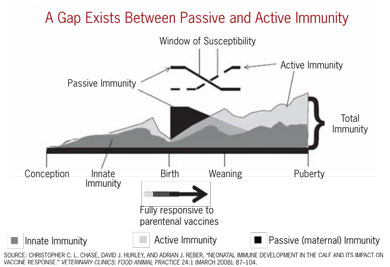Cattle Healthline

The immune system is crucial in mitigating stress-associated disease risk in calves. Stressed calves have a weaker immune system and a lower response rate to vaccines, making treatment difficult.
Early vaccination allows immunity to be established prior to the challenges that occur during weaning. The opportunity to prime the immune system through vaccination at a young age by generating a mucosal immune response helps set up the animal for a more effective cell-mediated immune response and, subsequently, more robust long-term immunity.
Vaccinations play a pivotal part in establishing and building immunity in calves and serve as an important preconditioning insurance plan. How soon after birth can a calf be effectively immunized?
Until recently, there was widespread uncertainty regarding the timing of calf vaccination. This was due to long-held beliefs that the newborn calf's immune system is not sufficiently developed to respond appropriately to vaccination and that maternal antibodies would adversely impact the effectiveness of any vaccine. But new research shows that calves respond to vaccination even before birth.
We now understand that calves have a fully functional immune system at 150 to 170 days of gestation. This fact has led to significant improvements in the approach we take to vaccinating young calves and trying to increase immune function.
Recent developments in vaccine administration, like intranasal vaccination, offer better ways to more quickly address respiratory disease in high-stress animals while priming the immune system.
Alternative routes. Intranasal administration means the vaccine antigens are delivered directly to mucosal surfaces in the nose—the major sites of immune response in cattle—which stimulates a faster response. Intranasal immunization can provide system-wide immunologic memory to future infection, hence priming the immune system.
Because intranasal vaccine antigens are delivered directly to the nasal mucosa, where maternal interference is less likely, most young animals respond to vaccination and develop active immunity. In addition, intranasal vaccine administration may help close the window of susceptibility when maternal antibodies' waning powers still repel vaccines but leave animals vulnerable to diseases. (See figure at left.)
A more thorough understanding of the bovine immune system has led to several distinct advantages in controlling and preventing infectious disease, as well as more effective vaccines. High-risk cattle, such as weaned calves and newborns, can now build their immune memory, thus priming the system for long-term health.
Talk with your veterinarian to determine if intranasal vaccination is right for your operation.
 |
SCOTT NORDSTROM, DVM, is manager of veterinary technical services at Intervet/Schering-Plough Animal Health. For more information, e-mail Scott.Nordstrom@sp.intervet.com.







